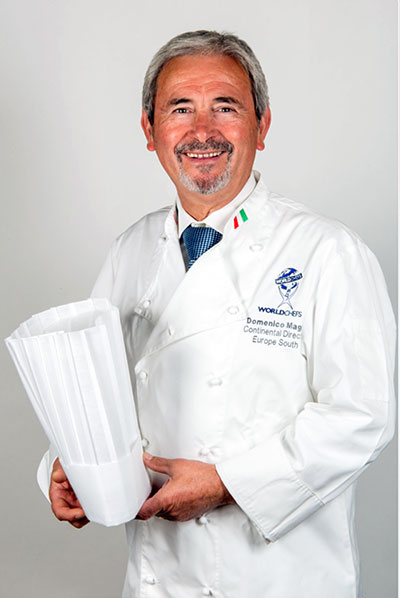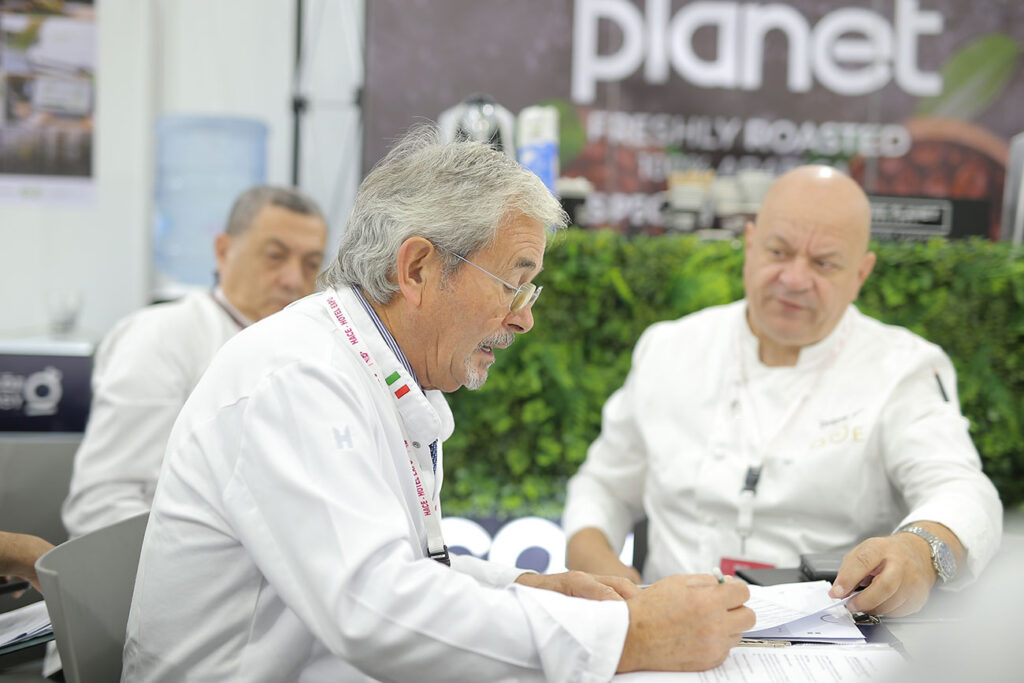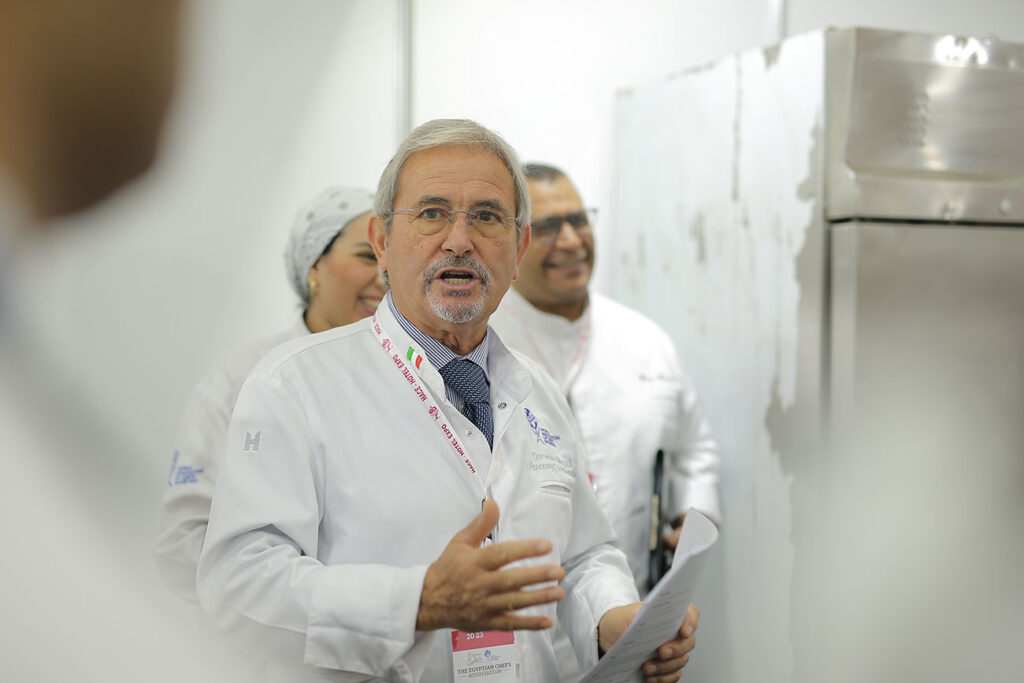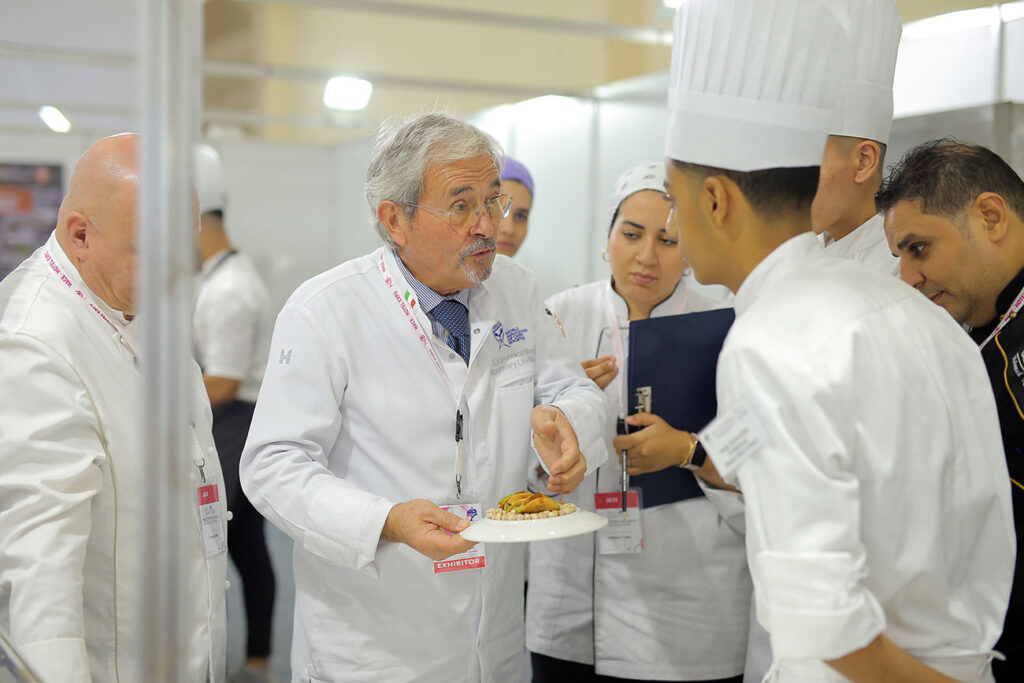

Interview

Born in 1953, Domenico Maggi embarked on his culinary journey at the tender age of 15. With a membership in the Federation of Italian Cooks (FIC) dating back to 1968, Maggi’s culinary prowess has left an indelible mark in restaurants and hotels across Italy, Switzerland, and the UK.
Serving as the Captain of the Italian National Culinary Team from 1997 to 2000, Maggi’s leadership skills and culinary finesse contributed significantly to the team’s success. His global recognition as an Ambassador of Italian Cooking speaks volumes about his commitment to promoting the rich heritage of Italian cuisine on an international scale.
With an impressive culinary career spanning over four decades, Maggi’s expertise has been sought after worldwide. From the vibrant culinary scenes of China, the USA, Brazil, Australia, to various corners of Europe, he has passionately promoted the flavors of Italian cuisine, captivating audiences with his culinary artistry.
Maggi’s dedication to excellence has been acknowledged through prestigious accolades earned in esteemed cooking competitions, both within the culinary haven of Italy and on the global stage. Currently holding the esteemed position of WorldChefs Academy Italian Advisor, and WorldChefs Honourary Life Member, Maggi continues to impart his wealth of knowledge and experience to aspiring chefs, shaping the future of culinary education.
Interview Conducted by: Amal Bassaly

During my formative years in culinary arts, I was fortunate to encounter pivotal experiences and mentors that shaped my journey profoundly. At the tender age of 15, I embarked on my culinary education at a catering college where I encountered a teacher who, while strict, possessed an immense heart and boundless passion for the craft. His guidance laid the foundation for my dedication to excellence. Additionally, my professional journey led me to Milan, where I had the privilege of working under a chef of remarkable cultural depth. He instilled in me not only culinary skills but also a broader appreciation for arts and culture, discussing topics ranging from music to theater and drama. Notably, he was the first chef in Italy to grace television screens in 1970. Under his tutelage, I learned the profound significance of cultural enrichment in the culinary sphere.
Joining the Italian Chefs Federationat the age of 16 was a pivotal moment in my culinary journey. Being part of such an esteemed association provided invaluable opportunities for growth and development. Membership granted me access to a vibrant community of fellow chefs, fostering connections and collaborations that enriched my culinary perspective. Attending association events and international gatherings exposed me to diverse culinary traditions and techniques from around the globe, broadening my culinary horizons. Participating in international competitions was particularly transformative, as it allowed me to showcase my skills and creativity on a global stage.
More than just earning medals or traveling abroad, these competitions provided invaluable learning experiences, as I exchanged knowledge and techniques with talented chefs from different backgrounds. In essence, being a member of the Federation of Italian Cooks since 1968 has been instrumental in shaping me into the chef I am today.
Having had the privilege of working in restaurants and hotels across Italy, Switzerland, and the UK, I’ve been exposed to a rich tapestry of culinary traditions and cultures. This diverse experience has profoundly influenced my cooking style in several ways. Firstly, as a chef, it’s crucial to appreciate and understand the nuances of different culinary cultures, especially when catering to a diverse clientele. Whether in a bustling restaurant or an upscale hotel, being aware of the preferences and palates of customers from various nationalities is paramount.
Moreover, this exposure has been instrumental in shaping my approach to innovation and creativity in the kitchen. Drawing inspiration from a wide array of culinary traditions, I incorporate elements of classical cuisines, flavors, and trends into my dishes. Understanding the foundations of different culinary styles allows me to infuse my creations with depth and authenticity, while also pushing the boundaries of traditional techniques to create exciting new culinary experiences.
Serving as the captain of the Italian National Culinary Team from 1997 to 2000 was indeed a remarkable journey filled with both highlights and challenges. One of the foremost challenges was to foster a cohesive team dynamic, recognizing that success relied not on individual prowess but on collective effort. Each team member needed to be not only skilled but also inspired and committed to teamwork. My approach to leadership emphasized open discussion and collaboration, I listen to different points of view, we discuss what are we going to present, and the way of presentation, because when you have different points of view, at the end you reach the balance, and that is the key to success.
Finding financial support, securing sponsors to facilitate international travel, posed another significant challenge. However, with unwavering determination and a shared vision, we overcame these obstacles. Ultimately, the key to our success lay in our ability to navigate challenges together, united by a common goal and fueled by passion for culinary excellence.

In my leadership role, I believe that understanding the diverse personalities and strengths of the chefs on my team was paramount to our success. As a leader, it’s essential to harness the unique talents of each individual, fostering an environment where everyone can thrive and contribute their best. Our primary objective was to showcase the richness of Italian cuisine, highlighting our ingredients and culinary traditions on a global platform. At Worldchefs, we want to celebrate the diverse flavors and identities of participating teams, promoting cultural exchange and appreciation. By leading with a balanced approach and a shared passion for Italian cuisine, I believe our team made a significant contribution to the promotion and recognition of our culinary heritage on the international stage.
Promoting one’s own country carries a significant responsibility. When you advocate for something deeply ingrained in your life, like food and flavors, it’s not merely acting a part – you become a protagonist. This stems from a genuine belief in what you’re doing, a whole-hearted commitment. Authentic pride in your cuisine, culture, and flavors shines through, resonating with your audience. Cooking with passion isn’t just about the ingredients; it’s about infusing each dish with a piece of your heart. This passion is palpable to guests, as they experience not just a meal, but a journey of love and dedication through every bite.

Preparing for cooking competitions requires more than just culinary skill; it demands meticulous planning and disciplined execution. My advice to aspiring competitors is to first acquaint themselves thoroughly with the competition rules by attending seminars or workshops. Understanding the expectations of the judges is essential for success. Competitions, in essence, are valuable learning experiences, offering insights into culinary standards and trends.
Discipline is the cornerstone of preparation. Regular training and practice, ideally within a group setting, allow chefs to identify and rectify mistakes. It’s advisable to train with someone who offers constructive criticism rather than mere encouragement, as honest feedback is invaluable for improvement.
Key considerations when planning a dish include selecting the finest ingredients, planning recipes, and preparing necessary tools and equipment. Hygiene and adherence to food safety regulations are paramount, as is minimizing food waste and prioritizing sustainability. Effective time management is equally crucial to ensure all components of the dish are executed flawlessly within the allotted time frame. Ultimately, meticulous preparation and attention to detail set apart culinary creations in competitions, paving the way for success and recognition.
Having served as a culinary college instructor for 41 years, I’ve witnessed firsthand the paramount importance of education in shaping culinary professionals. Italy boasts a robust educational system, comprising both governmental and private institutions, alongside numerous academies and schools. Regrettably, this comprehensive infrastructure is not universally accessible across the globe. Recognizing this disparity, WorldChefs has taken proactive steps by establishing the WorldChefs Academy—a groundbreaking initiative available online.
The WorldChefs Academy represents a transformative project, offering individuals the opportunity to enhance their culinary knowledge and skills at their own pace and convenience. Its meticulously structured curriculum ensures a comprehensive understanding of the fundamentals of the culinary profession, irrespective of geographical location. This accessibility is particularly noteworthy, as it empowers aspiring chefs from diverse backgrounds to pursue their culinary passions and aspirations regardless of their circumstances.
For young chefs embarking on their journey in the hospitality industry, I offer this advice: while our profession presents challenges such as long hours and physical demands, it also offers unparalleled opportunities for growth and fulfillment. Rest assured, organizations like Worldchefs are actively addressing industry concerns, including better structuring of working hours to promote a healthier work-life balance.
Culinary arts remain one of the most rewarding professions, where your passion for cooking translates directly into memorable experiences for guests. Beyond the kitchen, our profession opens doors to global exploration, allowing chefs to travel the world and see other countries, and other cultures . Embrace this opportunity for enrichment and discovery, and let your love for cooking guide you on an extraordinary journey in the world of hospitality.
Food serves as a powerful tool for cultural diplomacy, bridging nations and fostering understanding through shared culinary experiences. The food and hospitality industries are integral components of every country’s cultural identity and economy. Thus, it’s imperative to promote our culinary heritage abroad, ensuring that the world discovers and appreciates treasures like Parmesan cheese and extra virgin olive oil.
Moreover, food plays a pivotal role in international relations, often serving as the backdrop for significant diplomatic negotiations. Throughout history, peace treaties and agreements have been forged over shared meals, highlighting the unifying power of food. Chefs, in particular, bear a crucial responsibility in ensuring food safety, as any lapse in this regard can jeopardize relationships and lead to diplomatic complications.
In essence, by promoting our culinary traditions, we not only showcase our culture to the world but also contribute to fostering positive international relations grounded in shared appreciation for food and hospitality.